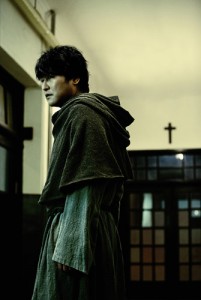Thirst
 More than 10 years ago, I wrote a script for a black comedy short film that was eventually produced for a film class I was taking. The movie was called Ray, The Low-Key Vampire, and it was about a vampire who didn’t like to disturb the public too much as well as not going to a lot of effort to obtaining the blood he required for sustenance. He spent a lot of time in blood banks and hospitals and the attendants all knew him. He would smoke a cigarette at the back door, before being signaled in to have his fill. His inertia annoyed other local vampires, they wanted to take advantage of the fear created by the vampire myth, and Ray was anything but scary.
More than 10 years ago, I wrote a script for a black comedy short film that was eventually produced for a film class I was taking. The movie was called Ray, The Low-Key Vampire, and it was about a vampire who didn’t like to disturb the public too much as well as not going to a lot of effort to obtaining the blood he required for sustenance. He spent a lot of time in blood banks and hospitals and the attendants all knew him. He would smoke a cigarette at the back door, before being signaled in to have his fill. His inertia annoyed other local vampires, they wanted to take advantage of the fear created by the vampire myth, and Ray was anything but scary.
Chan-wook Park’s Thirst, about a priest who volunteers for a dangerous medical experiment which turns him into a vampire, could have been taken from a bloated, drawn-out version of the Ray, The Low-Key Vampire script. Thirst retains Park’s technical expertise that he showed off to great effect in Sympathy for Lady Vengeance and I’m a Cyborg, But That’s Ok, but none of the gut-punch drama and emotional manipulation of Oldboy, one of the best films of the decade.
 Park starts Thirst off very strong, with the unnerving suspense and playful camerawork disorienting us as we watch Kang-ho Song, a veteran of Park’s films (J.S.A., Sympathy for Mr. Vengeance, Sympathy for Lady Vengeance), as the priest, as he tries to deal with the initial symptoms of the deadly virus he has subjected himself to. An early scene has the priest relaxing and playing a flute, and all of a sudden, blood gushes out of the flute, as if it were a geyser in a Saturday Night Live sketch. Since vampire lore is so familiar, it’s the tweaks that are key to keeping the audience interested, such as having the priest’s religious cloak stand in for the standard vampire cape, or having other priests being tempted by the thought of being able to live forever. Park maintains the off-kilter tension and humor for the first hour, yet he doesn’t stretch the genre tropes too much, combining the vampire film with the sexually tempted priest film. This is a promising concept, especially when it appears that the priest’s lover, Tae-joo, an orphan beaten down by her adopted family and thrown into a loveless marriage with an idiot, is aroused by the notion of his need to bite her. We keep waiting for the over-the-top-touch where the priest uses her menstrual blood as nourishment* and the wildly erotic sex scenes between them seem about to propose that idea.
Park starts Thirst off very strong, with the unnerving suspense and playful camerawork disorienting us as we watch Kang-ho Song, a veteran of Park’s films (J.S.A., Sympathy for Mr. Vengeance, Sympathy for Lady Vengeance), as the priest, as he tries to deal with the initial symptoms of the deadly virus he has subjected himself to. An early scene has the priest relaxing and playing a flute, and all of a sudden, blood gushes out of the flute, as if it were a geyser in a Saturday Night Live sketch. Since vampire lore is so familiar, it’s the tweaks that are key to keeping the audience interested, such as having the priest’s religious cloak stand in for the standard vampire cape, or having other priests being tempted by the thought of being able to live forever. Park maintains the off-kilter tension and humor for the first hour, yet he doesn’t stretch the genre tropes too much, combining the vampire film with the sexually tempted priest film. This is a promising concept, especially when it appears that the priest’s lover, Tae-joo, an orphan beaten down by her adopted family and thrown into a loveless marriage with an idiot, is aroused by the notion of his need to bite her. We keep waiting for the over-the-top-touch where the priest uses her menstrual blood as nourishment* and the wildly erotic sex scenes between them seem about to propose that idea.
 But something must have bored Park, because the second and third acts of Thirst play like scenes out of a totally different and much more incoherent film. Park did something similar in Sympathy for Mr. Vengeance, which, 80% of the time, is the most unique and inventive kidnapping film ever made. The other 20% is made up of plot contrivances and logical errors, completely gratuitous ones that could have been easily cut without hurting the story at all, as if Park was tired of re-inventing the kidnapping genre wheel, and he wanted to mess around to amuse himself. Thirst doesn’t even reach that level, after the first hour, Tae-joo goes from timid to aggressive and selfish, without any explanation at all, and we keep waiting for the reveal that act II is just a long dream sequence, to no avail. The previously ambitious film gets very small, confining itself to only a few cramped sets, and it’s never clear if Tae-joo’s husband is dead, a vampire about to seek revenge, a figment of everyone’s imagination, or just hanging out on a waterbed with a giant rock on his chest. The third act of Thirst is more entertaining, but at a caliber far lower than the original set-up. The priest plot gets thrown out (a shame, as in his counseling of a suicidal parishioner, he tells her, “Get God’s help through some science and take some anti-depressants”) and the macabre humor goes hay-wire with a random rape scene that has very little to do with anything. Anything the priest and the audience might have wondered about living life as a vampire, such as, how many calories does blood have, and can one get fat subsisting on blood alone, is jettisoned for mundane fight sequences and predictable kills.
But something must have bored Park, because the second and third acts of Thirst play like scenes out of a totally different and much more incoherent film. Park did something similar in Sympathy for Mr. Vengeance, which, 80% of the time, is the most unique and inventive kidnapping film ever made. The other 20% is made up of plot contrivances and logical errors, completely gratuitous ones that could have been easily cut without hurting the story at all, as if Park was tired of re-inventing the kidnapping genre wheel, and he wanted to mess around to amuse himself. Thirst doesn’t even reach that level, after the first hour, Tae-joo goes from timid to aggressive and selfish, without any explanation at all, and we keep waiting for the reveal that act II is just a long dream sequence, to no avail. The previously ambitious film gets very small, confining itself to only a few cramped sets, and it’s never clear if Tae-joo’s husband is dead, a vampire about to seek revenge, a figment of everyone’s imagination, or just hanging out on a waterbed with a giant rock on his chest. The third act of Thirst is more entertaining, but at a caliber far lower than the original set-up. The priest plot gets thrown out (a shame, as in his counseling of a suicidal parishioner, he tells her, “Get God’s help through some science and take some anti-depressants”) and the macabre humor goes hay-wire with a random rape scene that has very little to do with anything. Anything the priest and the audience might have wondered about living life as a vampire, such as, how many calories does blood have, and can one get fat subsisting on blood alone, is jettisoned for mundane fight sequences and predictable kills.
 The overstuffed nature of Thirst causes the movie to ramble for well over 2 hours, completely unnecessary, especially for what never stretches beyond a well made horror-comedy. I can hear Ray, in his surfer-blasé tone, sitting through Thirst and saying, “man, you were trying way too hard, we could’ve got in and out of here in 10 minutes if we just relaxed.”
The overstuffed nature of Thirst causes the movie to ramble for well over 2 hours, completely unnecessary, especially for what never stretches beyond a well made horror-comedy. I can hear Ray, in his surfer-blasé tone, sitting through Thirst and saying, “man, you were trying way too hard, we could’ve got in and out of here in 10 minutes if we just relaxed.”
* The priest has such an active sense of smell, that he rivals Divine in Polyester in the audible sniffing department.



